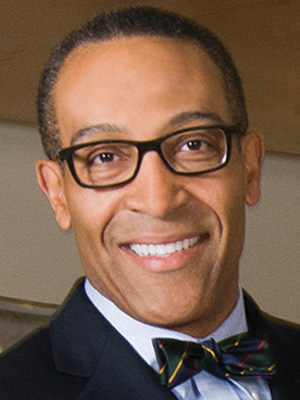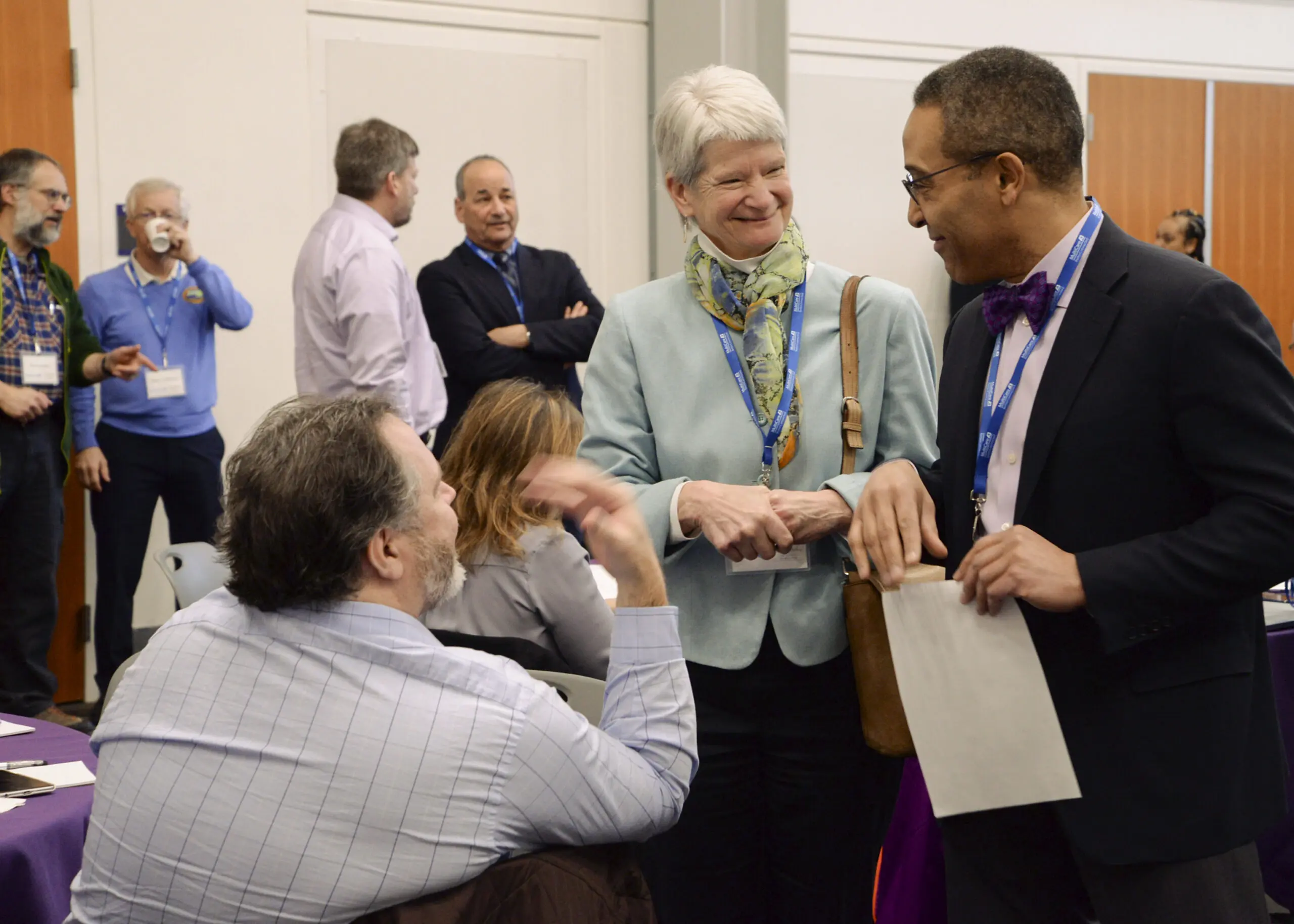
Dr. Byron Joyner
It takes leaders with vision to change the status quo, to see that the way things are isn’t the way they have to be. Byron Joyner, MD, vice dean for graduate medical education at UW Medicine, is that type of leader. His vision is to improve healthcare by strengthening support for all residents and fellows.
In 2019, he established the Vision Fund in Graduate Medical Education with a $30,000 challenge grant. The Vision Fund supports UW Medicine residents and fellows by advancing diversity, equity and inclusion initiatives, providing funding for conference travel and other professional development opportunities, and expanding wellness resources. It also supports the LEAD UP program, which offers one-on-one coaching, mentorship and networking opportunities for residents committed to diversity-related work.
“The Vision Fund allows trainees to recognize that they can be successful by building communities that are good for them and be around people who want to see them succeed,” Joyner says. He was inspired by the people who helped him as a trainee and young physician.
“I developed into the doctor and leader I am today through mentorship and the support I received from others, and I wanted to give that back,” says Joyner, who was the first Black surgeon at Seattle Children’s. “It’s about opening doors for others and giving them the chance to be real leaders in their communities, however they envision that.”
Training the next generation of medical leaders
With over 1,600 residents and fellows working at UW Medicine, there is plenty of demand for the Vision Fund’s services.
Residents and fellows, known collectively as trainees, are licensed physicians who have graduated from medical school and are pursuing the additional training required for them to practice a specialty independently. Residency, in particular, has historically been a difficult and demanding part of medical training.
“Wellness was not a concept when I was going through residency,” says Joyner. “If you had depression, you didn’t tell anyone. If you got treated badly, the next person got treated even worse. I wanted to bring something better than I had.”
The trainee experience has improved since Joyner was a resident in the early 1990s. The Accreditation Council for Graduate Medical Education (ACGME) now has requirements in place to prevent excessive workloads and ensure trainees have access to mental health care. In addition, UW Medicine’s residents and fellows are unionized, helping to ensure their salaries and benefits are sufficient to live in Seattle.

Dr. Joyner talks to attendees of the 2019 Graduate Medical Education summit at UW Tacoma.
Even with these improvements, residents can benefit from additional support. “Residents have always been on the low end of the hospital hierarchy,” says Joyner. “My role is to create a healthy, respectful working environment where we can move toward the goal of improving the health of the public — which includes our residents and fellows.”
The well-being of UW Medicine residents and fellows is vital to the health of UW Medicine patients, as well as patients in the WWAMI region (Washington, Wyoming, Alaska, Montana and Idaho). One in three UW Medicine physicians is a resident or a fellow, and 38% of those trainees will remain in the region after completing their education. When a good education is balanced with professional development opportunities, wellness resources and leadership training, residents have the potential to improve healthcare across UW Medicine and the WWAMI region.
Now more than ever, ensuring that residents and fellows stay in the region after completing their training is critical to meeting future healthcare needs, here and across the country. The Association of American Medical Colleges (AAMC) estimates that there will be a shortage of up to 124,000 doctors in the U.S. by 2034.
“The purpose of the Vision Fund programming is to produce leaders who will think of solutions to that shortage, and also think about the future of medicine beyond the shortage,” says Joyner. He envisions program alumni working to improve access to medical careers and serving as mentors for the next generation of physicians.
“You can’t truly open doors without seeing a positive vision in front of you,” says Joyner. The resources provided by the Vision Fund make that positive future a little easier to see, even amid one of the most demanding parts of medical training.
Inspiration from prior generations
For Joyner, it all comes back to the American dream: each generation making things better for the next.
Joyner says he wouldn’t be where he is without the support of his own community. His father, Bill Joyner, was a career military veteran and a civil rights advocate who worked with Martin Luther King Jr. and Jesse Jackson to fund Black-owned businesses. Bill encouraged his children to explore their own visions for the future, and knew education was the way to realize those dreams.
“‘If you’re breathing, you’re going to college!’ was our dinner table conversation,” Joyner says. “He knew that education would give you freedom and hope for the future.”
When asked about the ways beneficiaries of the Vision Fund can work to improve medicine and solve the physician shortage, Joyner’s mind naturally moves to education.
“I hope part of their vision will be developing other individuals who might not realize they can grow up to be physicians,” he says. “Trying to reach out further down the chain, to develop elementary school students and high schoolers, to get them interested in medicine.”
Joyner’s hopes for UW Medicine trainees mirror his own actions in trying to improve the residency and fellowship experience for today’s trainees.
“Even before I was vice dean for GME, I saw my position as being an advocate for the residents and fellows,” he says. “I want the best for them.” The Vision Fund comes from that position of advocacy.
Joyner isn’t the only faculty leader who’s advocating on behalf of UW Medicine trainees. He credits, among many faculty, nurses and staff, Marie Angele Theard, MD, an associate professor in the Department of Anesthesiology and Pain Medicine; G. Burkhard Mackensen, MD, PhD, FASE, chair of the Department of Anesthesiology and Pain Medicine; and Tim Dellit, MD, chief executive officer of UW Medicine and dean of the UW School of Medicine.
And, Joyner says, support from the community is essential to making the Vision Fund’s programs a long-term success. Generous gifts from donors can bring in more professional development speakers, fund travel to meetings for more trainees, provide wellness and mental health programs and expand the LEAD UP program.
Joyner has always been passionate about education — “I’ve made a career out of medical education, which has been immensely satisfying to me,” he says — and he also wants to help teach the public about what residents and fellows do.
“The next time you happen to be in a clinic setting or a hospital setting, I hope you’ll ask our young doctors whether they are a resident or a fellow,” he says, “and give them a kind word.”
Written by Alex Israel


